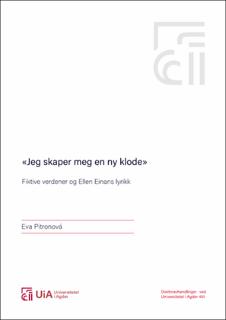| dc.description.abstract | This thesis examines the fictional potential of lyric poetry and demonstrates a fiction-based analysis on writings of the Norwegian poet Ellen Einan. In addition to the theoretical discussion of fictional worlds of lyric poetry, this monograph also introduces a previously unknown part of Einan’s writing, explores the visual dimension of her poems and presents the complexity of her works in an entirely new manner. The works of Ellen Einan have lots of world-building elements that help to establish a fictional universe. These elements work best when all her poems er merged into a bigger narrative. This is also how I conduct my analysis, where Einan’s entire writing production is explored as a lyric counterpart to large, fantastic narratives with one assembled fictional world.
The first part of the thesis consists of two relatively different theoretical chapters. The first one establishes a concept of the lyric fictional world, which is in my perspective a fusion between the theoretical concept of possible worlds (established by Thomas Pavel, Lubomír Doležel and Marie-Laure Ryan), and the idea of different subjects in poetry described by the Czech structuralists (Miroslav Červenka). At the same time, several narrative orientated viewpoints on the analysis of lyric poetry are presented and incorporated into the theoretical framework. The second chapter focuses on the genetic investigation of literary manuscripts, the creation of different versions and variations, and the process of literary rewritings. These two concepts – the idea of the lyric fictional world and the genetic approach to the manuscripts – create analytical tools for the text analysis and interpretation.
The analytical part of the thesis is divided into eleven shorter chapters which identify four fictionalizing elements in Einan’s poetic universe (the sense of logic and modal design, the poems’ internal chronology and fictional time, the sense of place, and the existence of fictional entities), as well as problematise different topics that shape her poetry (dance, death and burial, letters, and motherhood). The empirical basis is comprised of Einan’s published poems and her private archive that consists of hundreds of handwritten poem manuscripts (with or without drawings) and poem transcriptions written on a typewriter. The point of intersection between the reading strategies mentioned before and the primary research material is the construction of the fictional world of the poems through repetition of thematic structures and creation of an underlying narrative. Through this network of references the reader is able to discover and reconstruct a specific fictional world with a different, otherworldly ontology. This process creates a virtual community and landscape through short glimpses – represented in the poems – and in each poem directs another aspect of the fictional universe. The core of this world and this community is embodied in the entity of the nameless I, the lyric subject, which initiates almost all the poems and is presented here as a main character and a narrator simultaneously. The exploration of the lyric subject’s evolvement and relation to its fictional environment is at the centre of most of the poem analyses. In addition, the thesis tracks changes and reworkings in the manuscripts and scrutinizes their meaning for the fictional world of the poems.
This dissertation focuses specifically on the character of the lyric fictional world, but it also considers the interconnections between the poetical form and the fictional dimension of the poems – even if only to a lesser extent. Furthermore, the thesis challenges the traditional definition of lyric poetry, promotes the benefits of its fictional potential – which has generally been downplayed – and in this way brings new insight into the rethinking of the lyric genre. | en_US |

